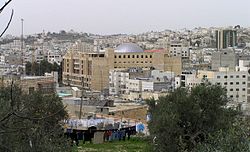Al-Khalil
| Hebron | |
|---|---|
| Other transcription(s) | |
| • Arabic | الخليل |
| • Also spelled |
Ḥebron (ISO 259-3) Al-Khalīl (official) Al-Ḫalīl (unofficial) |
| • Hebrew | חברון |

Downtown Hebron
|
|
| Location of Hebron within the Palestinian territories | |
| Coordinates: 31°32′00″N 35°05′42″E / 31.53333°N 35.09500°ECoordinates: 31°32′00″N 35°05′42″E / 31.53333°N 35.09500°E | |
| Palestine grid | 159/103 |
| Governorate | Hebron |
| Government | |
| • Type | City (from 1997) |
| • Head of Municipality | Daoud Zaatari |
| Area | |
| • Jurisdiction | 74,102 dunams (74.102 km2 or 28.611 sq mi) |
| Population (2016) | |
| • Jurisdiction | 215,452 |
| Website | www.hebron-city.ps |
Hebron (Arabic: الْخَلِيل ![]() al-Khalīl; Hebrew: חֶבְרוֹן
al-Khalīl; Hebrew: חֶבְרוֹן ![]() Ḥevron) is a Palestinian city located in the southern West Bank, 30 km (19 mi) south of Jerusalem. Nestled in the Judaean Mountains, it lies 930 meters (3,050 ft) above sea level. It is the largest city in the West Bank, and the second largest in the Palestinian territories after Gaza, and home to 215,452 Palestinians (2016), and between 500 and 850 Jewish settlers concentrated in and around the old quarter. The city is divided into two sectors: H1, controlled by the Palestinian Authority and H2, roughly 20% of the city, administered by Israel. All security arrangements and travel permits for local residents are coordinated between the Palestinian Authority and Israel via military administration of the West Bank (COGAT). The settlers are governed by their own municipal body, the Committee of the Jewish Community of Hebron. The city is venerated by Jews, Christians, and Muslims for its association with Abraham, containing the traditional burial site of the biblical Patriarchs and Matriarchs, within the Cave of the Patriarchs. In Judaism it is considered the second-holiest city after Jerusalem, while Islam regards it as one of the four holy cities.
Ḥevron) is a Palestinian city located in the southern West Bank, 30 km (19 mi) south of Jerusalem. Nestled in the Judaean Mountains, it lies 930 meters (3,050 ft) above sea level. It is the largest city in the West Bank, and the second largest in the Palestinian territories after Gaza, and home to 215,452 Palestinians (2016), and between 500 and 850 Jewish settlers concentrated in and around the old quarter. The city is divided into two sectors: H1, controlled by the Palestinian Authority and H2, roughly 20% of the city, administered by Israel. All security arrangements and travel permits for local residents are coordinated between the Palestinian Authority and Israel via military administration of the West Bank (COGAT). The settlers are governed by their own municipal body, the Committee of the Jewish Community of Hebron. The city is venerated by Jews, Christians, and Muslims for its association with Abraham, containing the traditional burial site of the biblical Patriarchs and Matriarchs, within the Cave of the Patriarchs. In Judaism it is considered the second-holiest city after Jerusalem, while Islam regards it as one of the four holy cities.
...
Wikipedia

